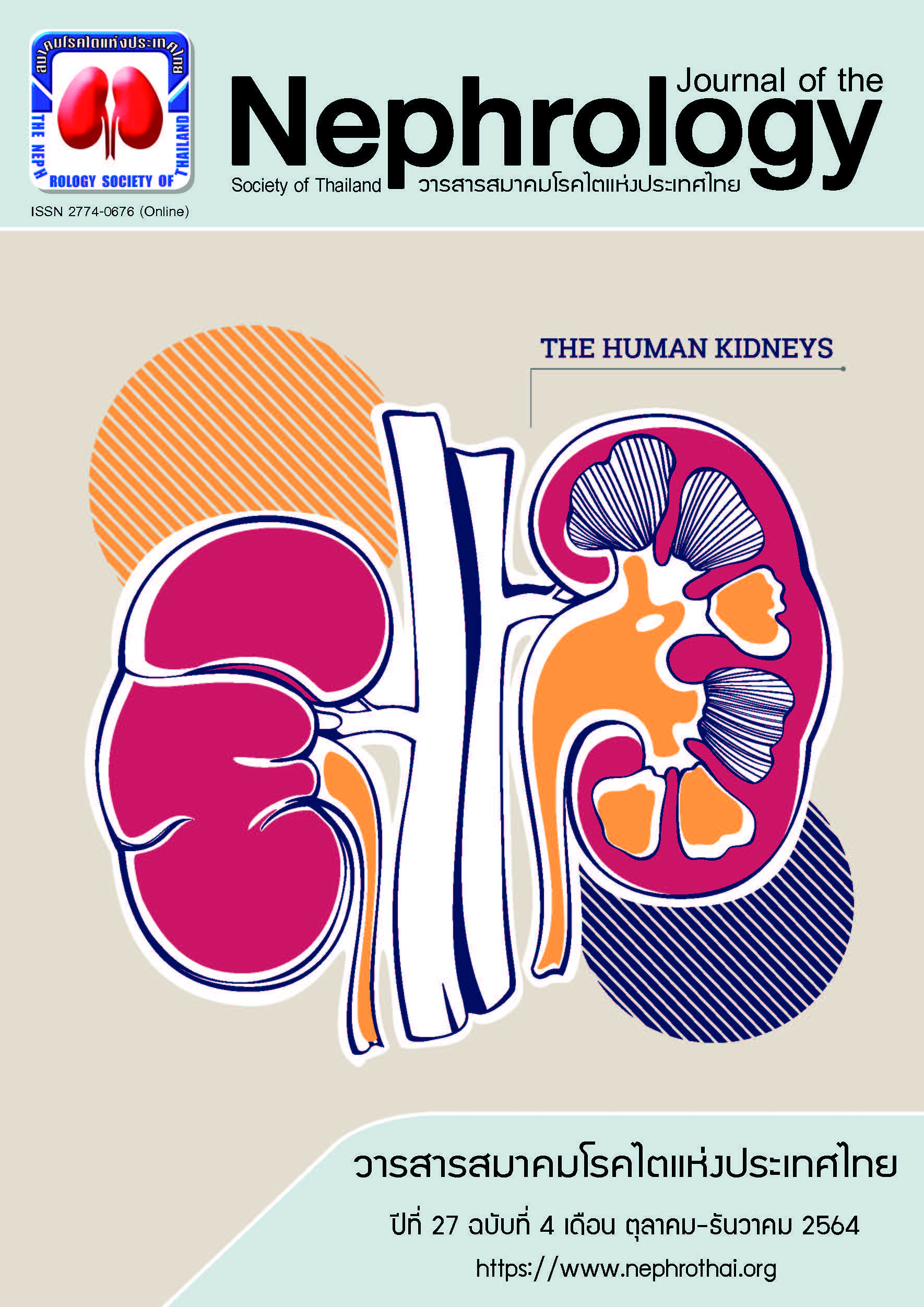Kidney adverse events from tyrosine kinase inhibitors
Main Article Content
Abstract
Tyrosine kinase inhibitors (TKIs) are one of the oncologic molecular targeted therapies interfering with cellular signal transduction by inhibiting the phosphorylation of tyrosine residue within substrate protein, resulting in down regulating cell proliferation and cell differentiation processes. Currently, TKIs are widely used to treat various types of malignancy due to their benefit of delaying tumor progression and increasing patient’s survival compared with conventional chemotherapies. Nonetheless, a large number of publications have reported kidney complications associated with these drugs including but not limited to acute kidney injury, acute glomerulonephritis, nephrotic syndrome, and electrolyte imbalances. Hence, awareness of these complications and regular laboratory monitoring is crucial for early detection in these groups of vulnerable patients. This article aimed to review the current data of TKIs on kidney complications regarding pathophysiology, management, and monitoring strategies. Also, a case is presented of one patient with gastrointestinal stromal tumor (GIST) at the stomach received sunitinib and developed acute kidney injury and nephritonephrotic syndrome suspected from TKIs.
Article Details

This work is licensed under a Creative Commons Attribution-NonCommercial-NoDerivatives 4.0 International License.
This article is published under CC BY-NC-ND 4.0 license, which allows for non-commercial reuse of the published paper as long as the published paper is fully attributed. Anyone can share (copy and redistribute) the material in any medium or format without having to ask permission from the author or the Nephrology Society of Thailand.
References
Jhaveri KD, Wanchoo R, Sakhiya V, Ross DW, FishbaneS. Adverse Renal Effects of Novel Molecular Oncologic Targeted Therapies: A Narrative Review. Kidney Int Rep. 2017;2(1):108-23.
Broekman F, Giovannetti E, Peters GJ. Tyrosine kinase inhibitors: Multi-targeted or single-targeted? World J Clin Oncol. 2011;2(2):80-93.
Folkman J. Tumor Angiogenesis: Therapeutic Implications. N Engl J Med. 1971;285(21):1182-6.
Jhaveri KD, Sakhiya V, Wanchoo R, Ross D, Fishbane S. Renal effects of novel anticancer targeted therapies: a review of the Food and Drug Administration Adverse Event Reporting System. Kidney Int. 2016;90(3):706-7.
Jhaveri KD, Flombaum CD, Kroog G, Glezerman IG. Nephrotoxicities associated with the use of tyrosine kinase inhibitors: a single-center experience and review of the literature. Nephron Clin Pract. 2011; 117(4):c312-9.
Gurevich F, Perazella MA. Renal effects of anti-angiogenesis therapy: update for the internist. Am J Med. 2009;122(4):322-8.
Marcolino MS, Boersma E, Clementino NC, Macedo AV, Marx-Neto AD, Silva MH, et al. Imatinib treatment duration is related to decreased estimated glomerular filtration rate in chronic myeloid leukemia patients. Ann Oncol. 2011;22(9):2073-9.
Zou AP, Cowley AW, Jr. Role of nitric oxide in the control of renal function and salt sensitivity. Curr Hypertens Rep. 1999;1(2):178-86.
Castilla MA, Caramelo C, Gazapo RM, Martin O, Gonzalez-Pacheco FR, Tejedor A, et al. Role of vascular endothelial growth factor (VEGF) in endothelial cell protection against cytotoxic agents. Life Sci. 2000;67(9):1003-13.
Eremina V, Jefferson JA, Kowalewska J, Hochster H, Haas M, Weisstuch J, et al. VEGF Inhibition and Renal Thrombotic Microangiopathy. N Engl J Med. 2008;358(11):1129-36.
Bollee G, Patey N, Cazajous G, Robert C, Goujon JM, Fakhouri F, et al. Thrombotic microangiopathy secondary to VEGF pathway inhibition by sunitinib. Nephrol Dial Transplant. 2009;24(2):682-5.
Costero O, Picazo ML, Zamora P, Romero S, Martinez-Ara J, Selgas R. Inhibition of tyrosine kinases by sunitinib associated with focal segmental glomerulosclerosis lesion in addition to thrombotic microangiopathy. Nephrol Dial Transplant. 2010; 25(3):1001-3.
Izzedine H, Escudier B, Lhomme C, Pautier P, Rouvier P, Gueutin V, et al. Kidney diseases associated with anti-vascular endothelial growth factor (VEGF): an 8-year observational study at a single center. Medicine (Baltimore). 2014;93(24):333-9.
Kamba T, McDonald DM. Mechanisms of adverse effects of anti-VEGF therapy for cancer. Br J Cancer. 2007;96(12):1788-95.
Sugimoto H, Hamano Y, Charytan D, Cosgrove D, Kieran M, Sudhakar A, et al. Neutralization of circulating vascular endothelial growth factor (VEGF) by anti-VEGF antibodies and soluble VEGF receptor 1 (sFlt-1) induces proteinuria. J Biol Chem. 2003;278(15):12605-8.
Gafter-Gvili A, Ram R, Gafter U, Shpilberg O, Raanani P. Renal failure associated with tyrosine kinase inhibitors--case report and review of the literature. Leuk Res. 2010;34(1):123-7.
Penel N, Blay JY, Adenis A. Imatinib as a possible cause of severe rhabdomyolysis. N Engl J Med. 2008;358(25):2746-7.
Vuky J, Isacson C, Fotoohi M, dela Cruz J, Otero H, Picozzi V, et al. Phase II trial of imatinib (Gleevec) in patients with metastatic renal cell carcinoma. Invest New Drugs. 2006;24(1):85-8.
Morrissey KM, Stocker SL, Wittwer MB, Xu L, Giacomini KM. Renal transporters in drug development. Annu Rev Pharmacol Toxicol. 2013;53:503-29.
O’Sullivan S, Horne A, Wattie D, Porteous F, Callon K, Gamble G, et al. Decreased bone turnover despite persistent secondary hyperparathyroidism during prolonged treatment with imatinib. J Clin Endocrinol Metab. 2009;94(4):1131-6.
Cortes JE, Apperley JF, DeAngelo DJ, Deininger MW, Kota VK, Rousselot P, et al. Management of adverse events associated with bosutinib treatment of chronic-phase chronic myeloid leukemia: expert panel review. J Hematol Oncol. 2018;11(1):143-.
Bellini E, Pia A, Brizzi MP, Tampellini M, Torta M, Terzolo M, et al. Sorafenib may induce hypophosphatemia through a fibroblast growth factor-23 (FGF23)-independent mechanism. Ann Oncol. 2011;22(4):988-90.
Izzedine H, Bahleda R, Khayat D, Massard C, Magne N, Spano JP, et al. Electrolyte disorders related to EGFR-targeting drugs. Crit Rev Oncol Hematol. 2010;73(3):213-9.
Voets T, Nilius B, Hoefs S, van der Kemp AW, Droogmans G, Bindels RJ, et al. TRPM6 forms the Mg2+ influx channel involved in intestinal and renal Mg2+ absorption. J Biol Chem. 2004;279(1):19-25.
Pande A, Lombardo J, Spangenthal E, Javle M. Hypertension secondary to anti-angiogenic therapy: experience with bevacizumab. Anticancer Res. 2007;27(5b):3465-70.


